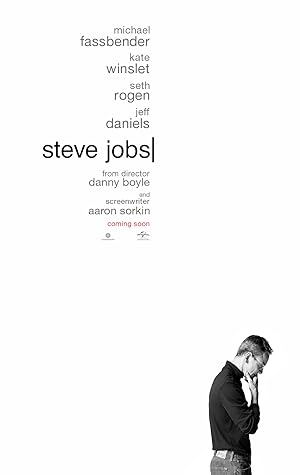Let’s discuss the elephant in the room. Steve Jobs does not look like Michael Fassbender. That casting was an extremely generous tribute to the now deceased icon. I watched Steve Jobs immediately after watching Steve Jobs: The Man in the Machine, and I think the drama suffered when compared to the documentary. Steve Jobs is Danny Boyle’s take on Birdman: or (The Unexpected Virtue of Ignorance).
Steve Jobs is a self-consciously structured film in three acts that take place during three different time periods. Each act is a behind the scenes launch of a new product: the Apple Macintosh in 1984, the NeXT Computer launch in 1988 and the iMac in 1998. These launches are emblematic of Jobs’ business and personal life at pivotal turning points: at the beginning of the end of his early success, at his lowest point before he returned to greatness and at the lowest point of his future success.
The central act is the most confusing one even for someone familiar with the general timeline of Jobs’ life. You do not have a choice and will have to watch a documentary like Steve Jobs: The Man in the Machine to understand what is transpiring. During the central act, when unfolding events are interspersed with point of view flashbacks exchanged between Steve Jobs and his business father-figure, John Sculley, the former CEO of Apple, played with understated perfection by Jeff Daniels, it is the only time that the characters appear in locations other than the site of the launch, i.e. it is the only time that they function as real people, not actors or producers of a marketing play. Otherwise Steve Jobs is not a biopic that gives the audience more information about the titular character as person. Steve Jobs is a way to use well-known figures to depict an old trope “Hey, Let’s Put on a Show” as a way to redeem someone. That someone happens to be Steve Jobs.
I usually love that trope, but I found the structure of Steve Jobs as a movie so artificial and at the forefront that the structure felt like a separate character. Steve Jobs is supposed to be an alienating figure so I’m sure that the film intended to create a certain distance between the audience and the subject. The structure made me feel more alienated from the performances and characters than perhaps was originally intended.
Steve Jobs’ cast is phenomenal. I love Kate Winslet and she is the woman behind the man and his conscience. Fassbender is lucky that True confession: when I watched Boardwalk Empire, I had a crush on Arnold Rothstein. I have a crush on Andy Hetzfeld, who plays the man that Jobs be to his eldest daughter, Lisa. Michael Stuhlbarg played Herzfeld and Rothstein. I feel better after watching Steve Jobs because I can conclude that I have a crush on the actor not some early twentieth century ruthless gangster. Seth Rogan may not have range, but he is perfectly cast as Wozniak, who plays the man that Jobs should have been to his friends and coworkers.
Steve Jobs as a movie may use an off-putting structured narrative to seek redemption for a magnificent bastard, but the contrived happy ending feels false. Steve Jobs tries to suggest that its titular character repented of his inhumane treatment of those around him and promises that he would do better, but that just wasn’t true. The acting may be excellent, but even I could not suspend disbelief at that fairytale ending. Watch Steve Jobs for the performances, but don’t be surprised if you can’t truly enjoy it.
Stay In The Know
Join my mailing list to get updates about recent reviews, upcoming speaking engagements, and film news.





